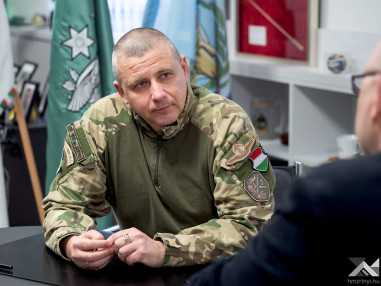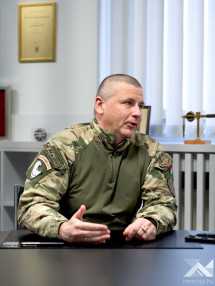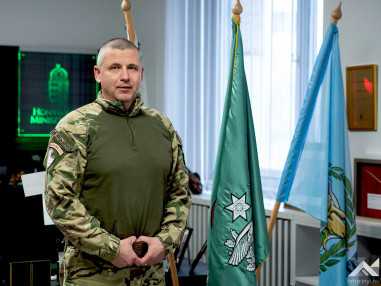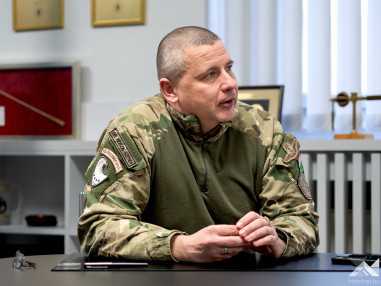“We believe that it is good to be a soldier”
Interview with Lieutenant General Romulusz Ruszin-Szendi PhD, Chief of the HDF General Staff
Text: László Szűcs | Photo: Sztaniszláv Horváth | 10:10 March 2, 2023“We need as many well-trained combat soldiers as possible in the interest of the defence of the homeland” – said Lieutenant General Romulusz Ruszin-Szendi PhD, Chief of the General Staff of the Hungarian Defence Forces in an interview to defence.hu. We talked with the Chief of the HDF General Staff about, among other things, the National Defence and Armed Forces Development Program, the countrywide recruitment campaign as well as the transformation and rejuvenation of the Hungarian Defence Forces.

As of 1 January, the General Staff is in control of the Hungarian Defence Forces instead of the Hungarian Defence Forces Command. What was the reason for this change?
I am convinced that the Hungarian Defence Forces have a General Staff. The HDF General Staff is the highest strategic command element. The change could have been simply a renaming, but actually there was much more to it. Our starting point was that we need as many well-trained and deployable combat soldiers as possible for the defence of the homeland, but since the manpower permitted by the National Assembly is fixed, we have been able to create more combat positions by streamlining the administration, the bureaucracy. One step in this process was that we significantly reduced the manning level of the Hungarian Defence Forces Command as well, and renamed it General Staff in the meantime. We have been able to establish further combat units by drawing on the personnel freed up this way. Instead of the earlier two, we have now three battalions as well as a brigade-level, special operations forces combat unit.
Have the service inspectorates become commands for the same reason?
Yes. I believe in the fundamental principle that one can pay attention to at most 7+2 things in the long term. With the establishment of component commands, we have achieved the objective that the number of organizations subordinated to these commands is less than 7+2, which means that one can now pay uninterrupted attention. It is also important that with this new organization, we have created a chain of command that is the same in war and in peace. At the same time, we also well aware that the cultures these commands represent are different. Although all soldiers wear the same uniform, the airman will be different from the one serving with a unit of the land forces, not to mention the SOF operators or the soldiers engaged in cyberspace operations. I think that the leaders of the component commands precisely understand their own cultures and are able to integrate them into the Hungarian Defence Forces as a whole.
Why has the reorganization involved the renaming of units?
We are speaking about a huge transformation, and the Minister of Defence and I thought that it would be a good idea to make these reforms visible in a number of ways. One is the renaming of units, which conveys the message that something completely new is starting in the Hungarian Defence Forces, rather than the continuation of the old. We borrowed the numbers and names from Hungarian military history and Hungarian military culture: we pay tribute to world war heroes and use the traditional numbering of units. We hope that all these things give extra motivation to the soldiers.

Another important part of the transformation is the rejuvenation of the Hungarian Defence Forces, which was announced by Defence Minister Kristóf Szalay-Bobrovniczky at the annual assessment and tasking conference in January.
We have known for a very long time – and I have also stated it countless times – that the age structure and rank hierarchy of the Hungarian Defence Forces are not optimal. Until now, however, we did not have any opportunity to let the colleagues go, as we could not put them on the street after 25, 30 or 35 years of service. Now is the time for the government to provide them with another legal status, and to take care of them as well. This process is not yet finished, it is currently under way, and I hope that we will see the benefits of rejuvenation already in the short term.
One recent success story of the Hungarian Defence Forces is undoubtedly the National Defence and Armed Forces Development Program. How is it going to continue this year?
We often say that the development of the armed forces is not a promise, because we can already see the new military equipment coming in. Besides the upgrade of the “big hardware” the soldiers’ individual tactical gears have also been renewed. And, of course, the program is going to continue in 2023 as well. According to plans, the first Airbus H225M helicopters and the new radar systems are scheduled to arrive. In addition, the numbers of the PzH self-propelled howitzers and the Lynx infantry fighting vehicles are going to increase further. Moreover, we are continuously “scanning” the world to see what items of military equipment can have a role in the development of the Hungarian armed forces.
In mid-February, the Ministry of Defence and the Hungarian Defence Forces launched a yearlong countrywide recruitment campaign. Why was that needed?
We had been drifting apart from society since the abolishment of conscription. Then, due to the coronavirus pandemic, the citizens met Hungarian soldiers at more and more places and with increasing frequency, and we received very positive feedback. For this reason, we though that we should show people, the youth that it is worth serving in the Hungarian Defence Forces because soldiering gives experiences and values, and also provides a kind of salary that one can earn as a decent living for one’s family. Also, those who are just adventurous can find their account in joining them, too so that is why giving a try to the Hungarian Defence Forces is worth it for them. Thus, there are innumerable opportunities that make joining the forces worth it these days. Our task is to try to show and explain to as many people as possible why it is good to be a Hungarian soldier these days. For we believe that it is good to be a soldier. That’s why we have launched the recruitment campaign with the slogan “Are you ready too?”
I was at this event that you announced the 175-km challenge run, which is intended to pay tribute to the Hungarian Defence Forces on their 175th anniversary this year. And you are participating in this challenge, too. How far have you got so far?
The challenge was also joined by the Minister of Defence, by First Lieutenant Szilveszter Pálinkás, a soldier of the HDF Joint Special Operations Command who is one of the “faces” of the recruitment campaign, and by Private Gergely Rozs, an athlete known from the Exatlon Hungary competition who will soon obtain a position as PT instructor in the personnel of the HDF Joint Forces Training Centre in Várpalota. The point of the challenge is that the entering four-man teams are supposed to run a distance of 175km until 7 April, which is the anniversary of the establishment of the Hungarian Defence Forces. We expect everybody wishing to participate in this challenge to come and join us. The Minister of Defence and I have already completed the first tens of kilometers.

The HDF Cadet Program has become increasingly popular in recent years. Can you count on its participants, too, as replacements for the Hungarian Defence Forces?
The figures speak for themselves. While we had some 300 cadets a couple of years ago at the military secondary school in Debrecen, today more than 7000 young people attend several schools and military student hostels around the country. By the way, cadet education takes place on three levels in Hungary. The third level, that of the military secondary schools and student hostels is operated by the Ministry of Defence. At present, we have four such schools operating in Debrecen, Nyíregyháza, Szolnok and Hódmezővásárhely. Although education started in the latter three garrisons one or two years ago, in Debrecen we already have final-year students as well for years. Close to 50% of them will put on the uniform to continue their careers as contract soldiers, NCO candidates or military officer cadets. That said, I always add that we must not see it only this way. It is much more important that those participating in the cadet program can get a much more precise picture of the armed forces and national defence. You don’t have to explain to these young people why it is important that they support national defence and the armed forces when they return to civilian life.
Last July, Defence Minister Kristóf Szalay-Bobrovniczky ordered you to increase the readiness of the armed forces – which means that the troops should go on more exercises more intensively and in larger formations, that their training should be accelerated and that more reservists should be called up. Is this process going to continue this year, too?
Of course, and it is essential to it that we have changed the duration and the program of instruction of basic training. It has already produced some results: those newcomer officers who have enlisted from civilian life can attain the rank of lieutenant after successfully completing a 18-week infantry platoon leader course instead of the earlier 6-week course offered for those without military qualification. In the future, we would like to run this 18-week training course synchronously for military officer cadets enlisting at the Faculty of Military Science and Officer Training of the National University of Public Service and for those civilians who have just finished their tertiary education and decided to join the Hungarian Defence Forces. Thus, they will receive a common basis of experiences that – hopefully – will accompany them throughout their military career. Besides all the above, we have increased the number of readiness duty services and reduced the readiness time. We have restored the institution of field training weeks, which means that rather than participating in a daily 8-hour training program, trainees have to stay in the barracks or the training area all week long, and they are to take part in various training sessions from morning to evening. We have introduced a new concept, which means that we use a procedure different from the earlier one in training the infantry battalions in executing their core tasks, and we proceed in the direction of mechanized infantry tactics with the arrival of new items of military equipment. The bottom line is that both the structures and the training of active-duty and reserve battalions will be the same, which will result in a significant increase of flexibility.
May there be more national and multinational exercises to come?
National exercises are important for our own capabilities, whereas the multinational ones are important from the aspect of the Alliance, so naturally, Hungarian soldiers will be involved in several training events this year in Hungary and abroad.
Last year, foreign missions accounted for a significant portion of the tasks of the Hungarian Defence Forces. Will there be any changes in this regard in 2023?
Our level of ambition does not decline, and we continue to need foreign missions. On the one hand, because this is how we can be valuable partners in the alliances. We are looking for opportunities to carry out new tasks in foreign missions so we can gain experience.

Hungarian Major General Ferenc Kajári’s one-year tenure as commander of KFOR for the first time in the history of NATO’s currently largest peacekeeping mission has been a great international success. Can we expect Hungary to obtain a leading role again in the ongoing operation in Kosovo in the future?
The Western Balkans have always been a region of outstanding importance to Hungary, and two-thirds of all our troops deployed on foreign missions are serving in the Balkans Joint Operational Area, in Kosovo and Bosnia-Herzegovina. Providing assistance in this region is among Hungary’s strategic priorities. The next step for us – and we have already made our offer – is EUFOR, since according to plans, in 2024 – the year of the Hungarian EU presidency – a Hungarian general will assume command of Operation Althea for a year.